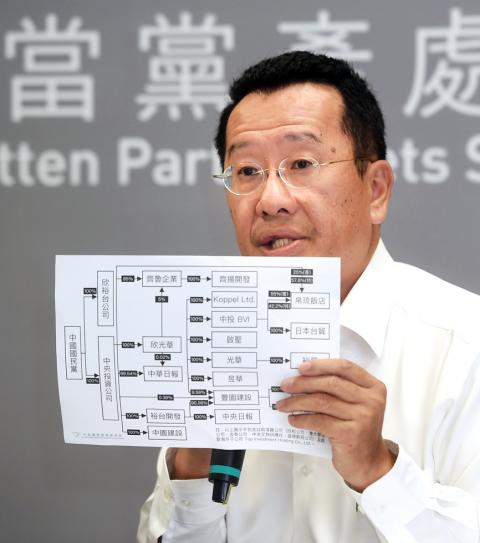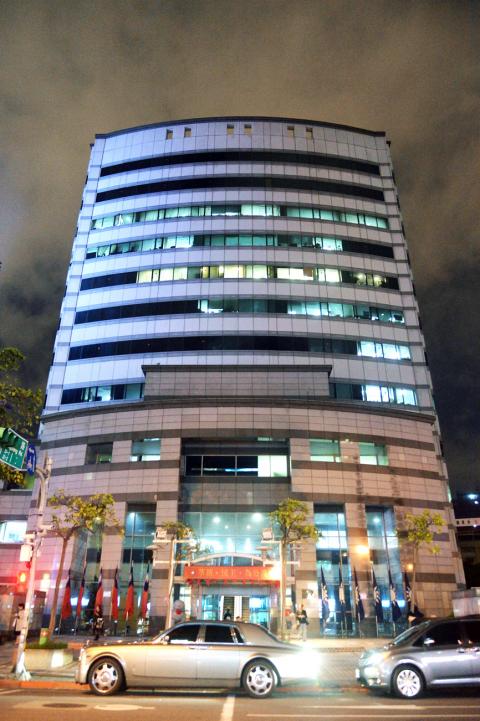The Chinese Nationalist Party (KMT) must transfer all its rights to shares issued by Central Investment Co (中央投資公司) and Hsinyutai Co (欣裕台) to the government, the Ill-gotten Party Assets Settlement Committee said yesterday, after concluding that the two companies were founded using illegally obtained assets.
Committee Chairman Wellington Koo (顧立雄) said the committee would send the KMT a letter of disposition no later than Tuesday and give it 30 days to comply with the assets transfer.
The “rent” the KMT pays for its headquarters on Taipei’s Bade Road, Sec 2 — registered under Central Investment and Hsinkuanghua Co (欣光華股份有限公司) — must be paid to the government after the transfer of shareholding rights, Koo told a news conference after the committee meeting.

Photo: Fang Pin-chao, Taipei Times
Central Investment is a wholly owned holding company of the KMT, while Hsinkuanghua is a fully owned subsidiary of Central Investment, the committee’s investigation found.
The KMT in late July signed a five-year contract with Central Investment and Hsinkuanghua to lease the building and paid the rent — totaling about NT$320 million (US$10 million) — in advance, despite not having allocated any funds for the rent this year, Koo said, adding that the KMT probably secured the lease out of fear of having its ill-gotten assets seized.
Citing the committee’s investigation, Koo rebutted KMT Administration and Management Committee director Chiu Da-chan’s (邱大展) claims on Thursday that Central Investment’s and Hsinyutai’s capital came from legitimate sources.

Photo: CNA
“In an era when there was no distinction between the party and the state, half of the KMT’s revenue came from state subsidies, while its affiliated organizations provided about 20 percent, and it had some other sources of income,” Koo said.
The KMT’s legitimate assets and income from the so-called “special surcharges” it levied on businesses to increase the national defense budget made up a tiny portion of its revenue, he said.
However, with the exception of 1959 and 1961, in which the then-KMT administration produced a surplus of NT$1.2 million and NT$220,000 respectively, the KMT had been mired in deficit from 1953 to 1971, accumulating a debt of NT$253.5 million, Koo said.
“How could the KMT have had NT$200 million of government securities when it founded Central Investment in 1972?” Koo said.
The committee has rejected the KMT’s request that it cash in Central Investment’s and Hsinyutai’s shares and property holdings to pay its employees’ pension and severance packages, because it would run counter to the commission’s decision that the KMT transfer the firms’ shareholding rights.
However, to allow the party to pay its employees’ health and labor insurance premiums, land taxes and pension, the committee has decided to unfreeze the KMT’s account at Bank SinoPac (永豐銀行), which has more than NT$350 million.
Including the rent it paid in advance and money in the account, the KMT has NT$1.25 billion from its legal sources of capital, including nine checks worth NT$468 million made payable to it by the Bank of Taiwan, the NT$100 million the Chang Yung-fa Foundation owes the party and NT$9 million in advance payments it made to an attorney, Koo said.
He urged the KMT to use this money to deal with fees it needs to pay its employees.

MAKING WAVES: China’s maritime militia could become a nontraditional threat in war, clogging up shipping lanes to prevent US or Japanese intervention, a report said About 1,900 Chinese ships flying flags of convenience and fishing vessels that participated in China’s military exercises around Taiwan last month and in January last year have been listed for monitoring, Coast Guard Administration (CGA) Deputy Director-General Hsieh Ching-chin (謝慶欽) said yesterday. Following amendments to the Commercial Port Act (商港法) and the Law of Ships (船舶法) last month, the CGA can designate possible berthing areas or deny ports of call for vessels suspected of loitering around areas where undersea cables can be accessed, Oceans Affairs Council Minister Kuan Bi-ling (管碧玲) said. The list of suspected ships, originally 300, had risen to about

DAREDEVIL: Honnold said it had always been a dream of his to climb Taipei 101, while a Netflix producer said the skyscraper was ‘a real icon of this country’ US climber Alex Honnold yesterday took on Taiwan’s tallest building, becoming the first person to scale Taipei 101 without a rope, harness or safety net. Hundreds of spectators gathered at the base of the 101-story skyscraper to watch Honnold, 40, embark on his daredevil feat, which was also broadcast live on Netflix. Dressed in a red T-shirt and yellow custom-made climbing shoes, Honnold swiftly moved up the southeast face of the glass and steel building. At one point, he stepped onto a platform midway up to wave down at fans and onlookers who were taking photos. People watching from inside

Japan’s strategic alliance with the US would collapse if Tokyo were to turn away from a conflict in Taiwan, Japanese Prime Minister Sanae Takaichi said yesterday, but distanced herself from previous comments that suggested a possible military response in such an event. Takaichi expressed her latest views on a nationally broadcast TV program late on Monday, where an opposition party leader criticized her for igniting tensions with China with the earlier remarks. Ties between Japan and China have sunk to the worst level in years after Takaichi said in November that a hypothetical Chinese attack on Taiwan could bring about a Japanese

The WHO ignored early COVID-19 warnings from Taiwan, US Deputy Secretary of Health and Human Services Jim O’Neill said on Friday, as part of justification for Washington withdrawing from the global health body. US Secretary of State Marco Rubio on Thursday said that the US was pulling out of the UN agency, as it failed to fulfill its responsibilities during the COVID-19 pandemic. The WHO “ignored early COVID warnings from Taiwan in 2019 by pretending Taiwan did not exist, O’Neill wrote on X on Friday, Taiwan time. “It ignored rigorous science and promoted lockdowns.” The US will “continue international coordination on infectious